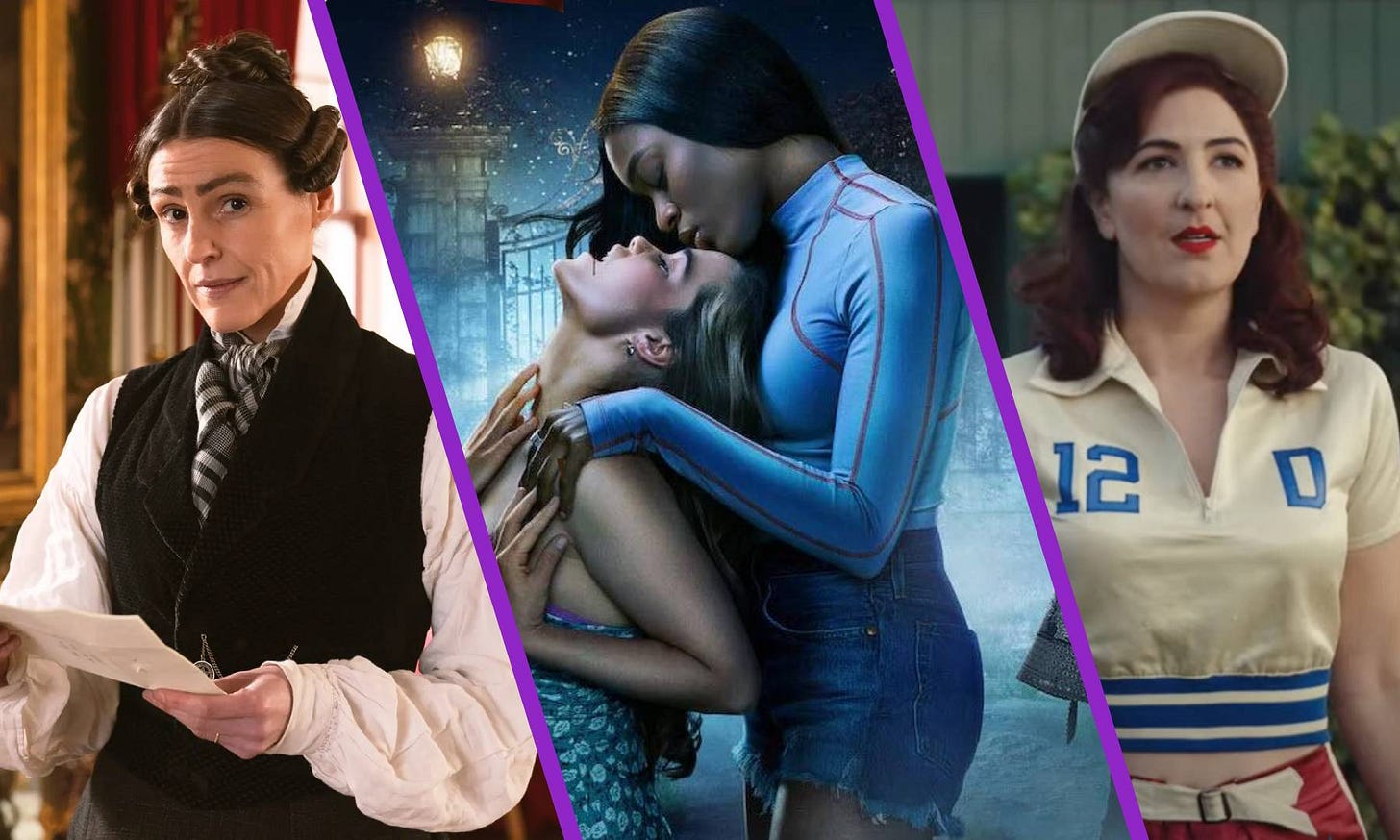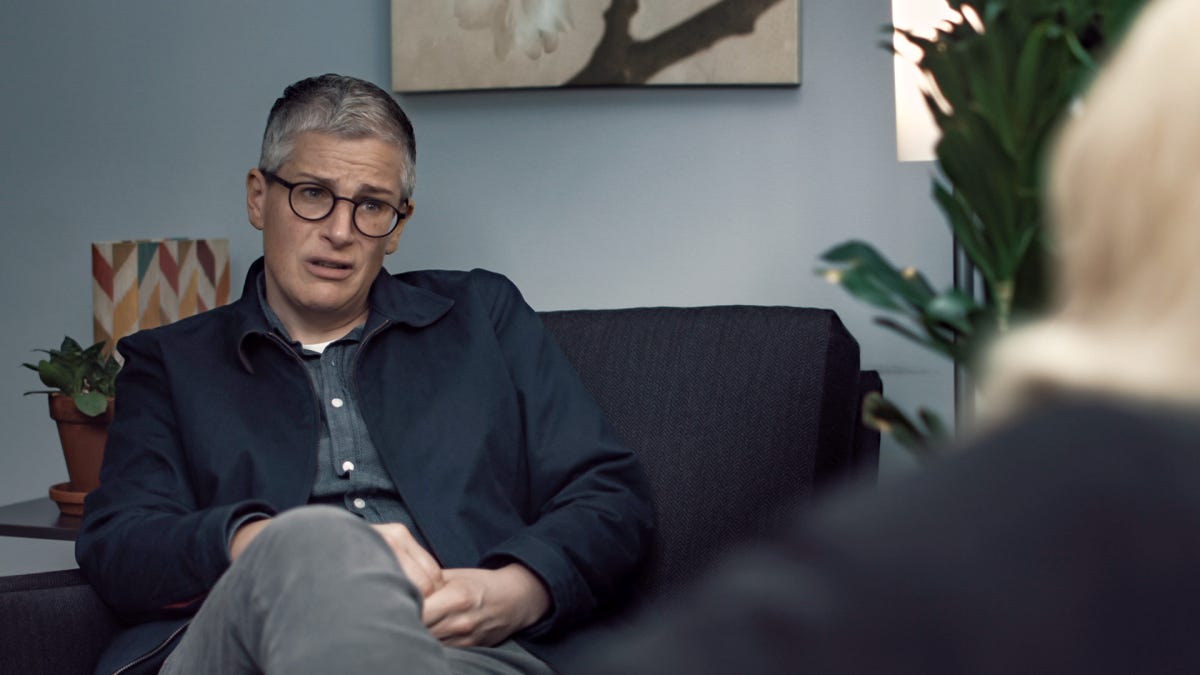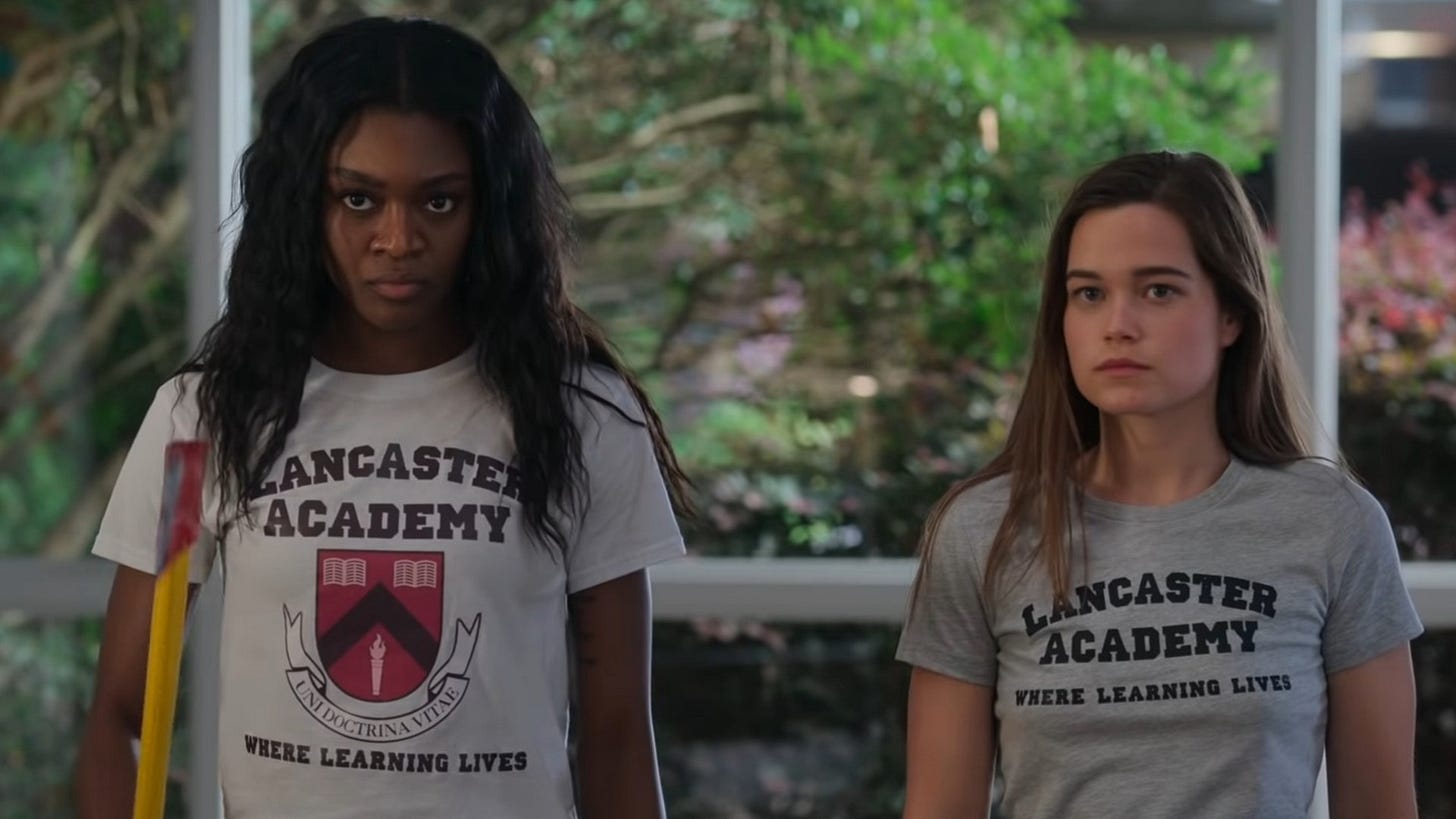Is Lesbian TV Dying?
Paging Dr. Lesbian’s ‘Where We Are On Lesbian TV’ report
This is the Sunday Edition of Paging Dr. Lesbian. If you like this type of thing, subscribe, and share it with your friends. A paid subscription gets you more writing from me and will help me keep this newsletter afloat. Consider going paid!
First, they came for the lesbians, and then….they kept coming for the lesbians.
The story goes something like this: In July of this year, HBO announced it would not be renewing the critically-acclaimed lesbian period drama Gentleman Jack, which the company produced alongside the BBC. A couple of weeks later, Netflix announced the cancellation of its critically-maligned yet voraciously devoured lesbian vampire series, First Kill. Also around this time, Amazon canceled their series The Wilds, which features a lesbian couple as part of the main cast, after two seasons.
These aren’t the only examples of lesbian and queer cancellations this year, as many Twitter users quickly pointed out. Other lesbian-centric shows we have lost since last year include Batwoman, Wynona Earp, Supergirl, Killing Eve, Atypical, Legends of Tomorrow, Dickinson, The Owl House, Motherland: Fort Salem, and Work in Progress.
There are many differences between these shows both in terms of their content and the context of their cancellation. Some of them – Gentleman Jack, Work in Progress – were high-quality series that were critically respected despite relatively low viewership. Others – such as First Kill – were far from critically acclaimed but quickly gained a passionate fan base. First Kill and Gentleman Jack were canceled after only one or two seasons, respectively, while Supergirl ran for six seasons and Legends of Tomorrow ran for seven. Wynona Earp concluded its fourth and final season last spring, but the season was only completed in the first place because of a sustained fan campaign to save the show. Batwoman, one of the few contemporary shows featuring a black lesbian, was canceled after three seasons earlier this year, while Black Lightning, which features two queer women of color, was canceled after four seasons last year. I’m sure I don’t need to remind you how Killing Eve ended.
Not all of these shows are comparable and the genres in which they exist vary, but it’s hard not to see a trend here. It’s not as if there is some big conspiracy wherein studio executives are plotting against lesbian television, but nothing – especially in this trend-driven pop culture landscape – happens in a vacuum, either. Unsurprisingly, this trend hasn’t gone unnoticed by lesbian viewers. As one Twitter user put it, “2022 hates lesbians.”
So how do we unpack what’s going on here? One of the elements at play is bigger than just lesbian television. We are currently in an era defined by an abundance of content. Hundreds of new shows are being produced every year – every month, even – and the amount of content available to us seems unimaginably vast at times. But, as many had predicted at the onset of this TV explosion, it seems the streaming bubble has begun to pop.
HBO Max recently announced they will begin moving away from producing original series as part of their merger with Discovery+, and they have even started removing their own original titles from the platform in order to cut costs. (This new business model is likely in part to blame for the cancelation of Gentleman Jack.) Meanwhile, Netflix just lost a million subscribers last quarter, which was actually half the amount they had predicted. (Their shares have fallen significantly since last year.) It’s clear that the business model for streaming platforms like these is no longer sustainable, but what this means for the future of television production isn’t totally clear. This belt-tightening doesn’t bode well for lesbian-centric television, which is still considered a niche category within the broader television landscape.
In terms of these specific cancellations, there is clearly a lack of support here, both in terms of viewership numbers and institutional, monetary support. In regard to viewership, the problem is this: when it comes to lesbian television and films, the only people truly riding for this content are other lesbians and sapphics. The same cannot be said for content featuring gay or queer men, the likes of which often finds a passionate fan base made of up straight (and queer) women. This notion of isolation is not a new idea, but it bears repeating considering the current media landscape.
The other side of the coin is the relationship between lesbian content and media production companies. In the case of First Kill, the budget was clearly very tight (likely one of the largest contributors to its low quality), and Netflix didn’t seem very keen on allocating any more money for marketing, either. Many fans of the show complained about its lackluster marketing, and showrunner Felicia D. Henderson backed them up. Henderson told The Daily Beast that she was disappointed in the lack of effort put into marketing the series, and, interestingly enough, sources close to the show have argued that the marketing was too focused on the show’s lesbian storyline, which may have scared off potential viewers. Fans of Gentleman Jack have complained about a similar lack of effort on the part of HBO, which is in contrast to the efforts of BBC, who have done much more to promote the show in the UK.
While the cumulative effect of these events may point to a bleak future, it’s not as if there haven’t been any good lesbian shows over the last few years. As I’ve written about before, Gentleman Jack is a brilliant series not only because of how explicitly lesbian it is, but also because of how it challenges its viewers. Abby McEnany’s Showtime series Work In Progress is like nothing I’ve ever seen before and is brilliant in part because of the very specific perspective it describes. It’s not “universal” television, and that’s exactly what makes it great. HBO Max’s Generation includes one of the most interesting, in-depth depictions of queer teens ever captured on screen. (It was canceled after one season while HBO’s other, far less nuanced teen show, Euphoria, was renewed. Tragically, the entire series has just been removed from HBO Max.)
The Starz series Vida – which was canceled after three seasons – is totally unique, riveting television that packs a punch in every episode. Before creative control switched hands, Killing Eve felt new, fresh, and utterly thrilling in its exploration of queer desire. First Kill certainly isn’t as formally creative or intellectually stimulating as the rest of these shows, but it obviously gave fans a taste of what they had been craving, existing as a sugary moment of wish-fulfillment for these viewers. I would also add Desiree Akhavan’s The Bisexual to the list, as it’s a totally groundbreaking look at a bisexual coming-out story.
Apart from the once-brilliant Killing Eve, which gained a significant amount of mainstream support, these shows were never truly recognized for their excellence. This is a disheartening trend, and it sets a troubling precedent. As I mentioned before, it’s obvious that lesbian shows such as these primarily receive support from other lesbians, which, from a numerical standpoint, isn’t enough for production companies to greenlight more episodes.
But perhaps, all hope is not lost. Last week saw the release of the new Amazon series A League of Their Own, which was co-created by Broad City’s Abbi Jacobson. The series – which features numerous lesbian characters – has been getting rave reviews from lesbian and queer viewers and is being celebrated for its diverse, nuanced portrayal of the lesbian community in the 1940s. Nonetheless, the show immediately received a significant amount of backlash upon its release, with disgruntled viewers leaving homophobic reviews on Amazon and lowering the show’s overall rating significantly. (The rating has since improved thanks to a counter-attack of positive reviews.)
Despite the deluge of positivity lesbian and queer viewers have lavished on the show, this initial outpouring of bad reviews indicates that lesbian television is still far from a guaranteed success. Indeed, it seems clear that television shows that prominently include lesbian characters have to fight against the prospect of this widespread prejudice from the start. Queerness, and especially lesbianism in television is often considered “too much” by viewers who aren’t seeking out characters like these. These viewers don’t want to see even a hint of lesbianism while they are trying to enjoy America’s favorite pastime, thank you very much.
In response to this crop of negative reviews, Jacobson wrote on Twitter that these hateful responses only made her “more sure about why this reimagining needed to be made.” She’s right, of course, but media conglomerates aren’t exactly in the business of saving the world. When it comes down to it, it’s the money that matters. But does the relative success of A League of Their Own change the landscape, or help us answer these questions? Is one show enough?
Perhaps this is also a question of scale and form. There are other places besides streaming services to support lesbian and queer content. For example, lesbian films and television shows frequently premiere at LGBTQ film festivals, which you can often support by buying a digital pass and streaming this content online. When something shows at a film festival, that often means it doesn’t yet have distribution, so showing up (either in person or online) to watch the film or show makes a difference in regards to the future of that project.
We should also consider how we are thinking about the form lesbian television takes. The creators of HBO Max’s Harley Quinn series have explicitly said that Harley and Ivy will stay together for the foreseeable future, and the couple is an unexpectedly heartwarming example of a fictional lesbian relationship. But because it is a 20-minute animated series, it’s often overlooked.
There’s also something to be said for considering the international context of television streaming. A Filipino series called Sleep With Me (which initially premiered at OutFest) became available on the Filipino streaming platform iWantTFC this week, much to the excitement of those who are able to watch it. The international element complicates things in terms of access, of course, but it’s useful to keep in mind the global nature of these discussions.
So, here’s my prognosis: if the streaming bubble has indeed popped (which seems to be the case), then the television landscape will continue to adapt going forward. On a basic level, this probably means fewer shows will be produced. Netflix is working to create more “tentpole” series, such as Stranger Things, that will bring in large numbers of viewers, but this could potentially limit the number of shows they produce overall. Meanwhile, HBO Max’s merger with Discovery+ spells out a future that involves less original programming, despite the fact that HBO and HBO Max shows have been quite successful during awards seasons over the last several years. It’s also obvious that there is an alarming lack of disregard for the preservation of film and television on the part of these streaming companies, a cynical oversight that comes as a blow to both the producers and the viewers of said art.
The question is, where does lesbian content fall within this new paradigm? As we’ve seen proven time and time again, shows with a primarily lesbian viewership aren’t seen as profitable ventures or sound business investments, despite the regularly demonstrated fervor of lesbian and sapphic fans. This assumption was made strikingly clear by the discussions within Netflix about First Kill’s lesbian storyline being too niche (at least as far as advertising goes). If we are to take away anything from these recent revelations, it’s that lesbian media needs broader support if it’s going to continue to thrive in an increasingly fickle television landscape.
If we really want to get to the heart of the issue, it all comes down to capitalism. Contrary to popular belief, our current economic system does not actually breed innovation or diversity of thought. Indeed, as some of the big streamers begin to struggle financially, the content they produce going forward will get much broader – rather than more niche – as a means to capture the biggest audience possible. This doesn’t necessarily bode well for lesbian and queer content, but perhaps A League of Their Own is an example of why this reductive broadening need not be the only way forward.
It remains unclear what the future of television will hold, but it sure as hell better include lesbians. (Or else).







The increasingly difficult political climate (in the us) and the many many shows we lost this year are very disheartening ngl. But we still got our community, we still got piracy and we still got shows like 'A League of their own' that are amazing and bring us closer together and we still got all the writers and podcasters and overall dedicated people that bring life into our community. Its all not so great rn but we gotta stick together and not let all that get us down. We always where fighters and they're not gonna stop us now. Stay safe!
We’re all we go... for real.
People really still see queerness in the lens of sexual acts and not a culture, experience, or community. I say keep pushing, keep challenging the viewership... there will be something that sticks. There will be a place if we keep trying.